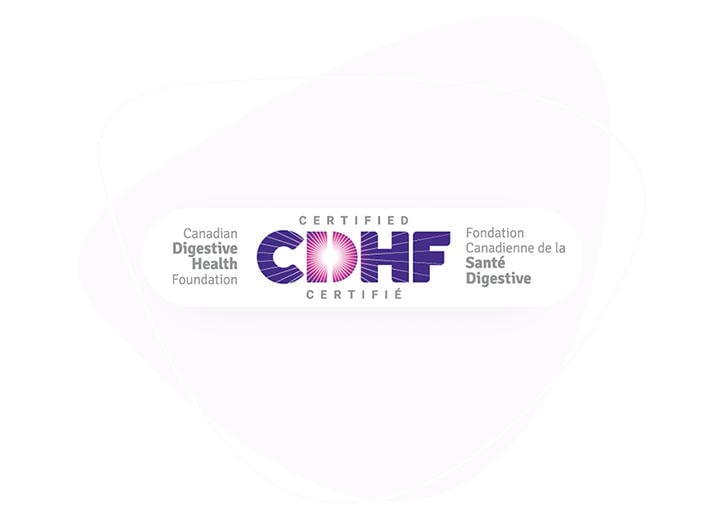Constipation 101
Constipation and Fibre
Article developed in partnership with Canadian Digestive Health Foundation (CDHF)
Constipation — you’ll know when you have this digestive condition. It means infrequent or difficult bowel movements. It often occurs when digested food moves too slowly through the digestive tract. As a result, the body removes (absorbs) too much water from the stools, causing them to become hard, dry and difficult to pass.
Constipation is very common! One in four Canadians has symptoms of constipation. It can affect the young and elderly and everyone in between. For some people, constipation develops suddenly and lasts for a short time. For others, particularly older people, it may begin gradually and last for an extended period of time.
There are several different reasons someone can be constipated. Some reasons include:
- Not enough fibre or fluids in the diet
- Not enough physical activity
- Changes in toilet routines (for example, when on a vacation)
- Not using laxatives properly
- Some medications or supplements
Following a high-fibre diet can be a good way to ease symptoms of constipation. High-fibre foods help your stools stay soft by holding on to liquid.
Types of Fibre:
There are two main types of fibre:
- Soluble fibre: As their name suggests, soluble fibres dissolve in water.
- Insoluble fibre: Insoluble fibres also help keep you regular. Insoluble fibres are neither broken down nor absorbed. They remain intact and provide bulk to what travels down the digestive tract. They help prevent intestinal blockages, constipation and hemorrhoids.
It’s important to get a variety of fibre in your diet to get the health benefits of both types of fibre. CDHF always recommends when increasing your fibre intake, start out with smaller doses and increase over time. If you want to increase your intake, consider choosing the following:
- Fruits: Choose fresh fruit over fruit juice, as the skin and pulp found in fresh fruit is packed with fibre. Apples, apricots, grapefruit, mangoes and oranges all offer high sources of soluble fibre. Dried fruits, including dates and prunes, are well known for their role in relieving constipation. These foods are high in insoluble fibre and keep your bowels moving.
- Vegetables: Vegetables are rich in fibre, vitamins and minerals and they make great snacks! Carrots, celery or cucumbers are delicious on their own or dipped in hummus and are loaded with fibre. Potatoes, Brussels sprouts, turnips, sweet potatoes and asparagus are all great sources of fibre.
- Whole Grains and Cereals: Choose whole grains whenever possible. Refined grains have all or part of the germ and bran removed, removing the valuable fibre, vitamins and minerals, whereas whole-wheat flour, whole grains and wheat bran are chock-full of insoluble fibre.
- Beans, Peas and Lentils: Black beans, kidney beans and navy beans are especially high in soluble fibre. Lentils, peas, carob, soybeans, clover, peanuts, alfalfa and tamarinds are all considered stellar sources of fibre. Add cooked beans or lentils to meat dishes such as stews, chillies, lasagne or stir-fries.
- Seeds and Nuts: Seeds and nuts are powerhouses for nutrients and fibre. Consider mixing seeds and nuts into your favourite muffin recipe, salads or stir-fries. Finely chop almonds and walnuts and then add them to soup. Sprinkle ground flaxseed on your favourite breakfast cereal for a quick and easy boost of fibre.
If you still aren’t reaching your fibre needs through food to help relieve constipation, sometimes adding a fibre supplement to your diet can help. When choosing a supplement, always read the label and make sure you are choosing the right one for you. RestoraFIBRE® gummies are great for those on the go, and are packed with the soluble fibre inulin. Two gummies twice a day can give you eight grams of fibre a day!
References:
Canadian Digestive Health Foundation. (2021). https://cdhf.ca"
Proudly certified by the Canadian Digestive Health Foundation (CDHF)
RestoraLAX® proudly displays the CDHF Certified Symbol of Distinction which indicates that the Foundation acknowledges the efficacy of RestoraLAX® for the relief of occasional constipation.






